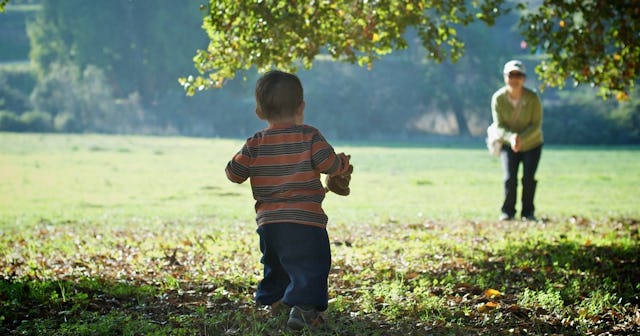Curious About Free-Range Parenting? Here's What You Need To Know

Every parent has their own style, sometimes informed by how they were raised by their own parents. Anyone with kids knows that all parenting styles really exist on a spectrum — some days you have more time and attention to devote to your children than others. Saturday could mean a trip to the playground, walk around the park, and a picnic lunch, while Sunday’s a pajama day where the whole family sits on the couch and watches movies together. But in a broader context, some parents deliberately choose to follow one particular style.
Perhaps the most famous of those is helicopter parenting, which is exactly what it sounds like: hovering over their kids and rescuing them if they get in the slightest bit of trouble. Clearly, that approach isn’t for everyone. So when the concept of free-range parenting entered the discussion, many people were eager to learn more about this style. Here’s what you need to know about free-range parenting.
What is free-range parenting?
In short, free-range parenting encourages a child’s independence, while still under some form of parental supervision. Though this concept is hardly new (think back to all the freedoms you may have had growing up), the term “free-range parenting” itself caught on in 2008, when Lenore Skenazy wrote a column for the New York Sun on how she allows her nine-year-old son to take the subway by himself. Needless to say, a lot of people were not impressed by this — some even dubbed her “America’s Worst Mom” — but at the same time, others were intrigued by this style, which seemed like the opposite of the also-aligned helicopter parenting style. Since then, Skenazy has run the website Free-Range Kids, where she aims “to separate the real dangers from the ones foisted upon us by the media, and by other folks with things to sell.”
Is free-range parenting neglect?
“Free-range parenting isn’t about being permissive or uninvolved,” Amy Morin, a licensed clinical social worker, writes at Verywell Family. “Instead, it’s about allowing kids to have the freedom to experience the natural consequences of their behavior—when it’s safe to do so. It’s also about ensuring kids have the skills they need to become responsible adults.”
Are there restrictions related to free-range parenting?
Free-range parenting has received plenty of criticism from those who say that it can be hard to distinguish between the parenting style and neglect. As Morin points out, there is a lot of debate over questions like:
- At what age should a child be allowed to stay home alone?
- When is a child old enough to stay alone overnight?
- What’s the age that a child should be allowed to walk down the street alone?
- Can a child play at the park without an adult in attendance?
- At what age should an older sibling be able to supervise younger children?
And in some instances, aspects of free-range parenting may be illegal. That’s because, as Skenazy explains, there’s a patchwork of different laws across the country when it comes to children being unsupervised. Skenazy has become a public advocate against harsh local laws that punish parents for giving children age-appropriate independence, such as walking home from the park.
But to help you navigate those, she put together a guide on her website that outlines the rules in each state.
What are some examples of free-range parenting?
Ultimately, free-range parenting is all about developing your child’s decision-making skills and teaching them how to react to their situation and environment in a safe, responsible way. A few examples might include:
- Instead of making sure your child is signed up for every single extra-curricular activity (we know, it’s for their college application) and shuttling them from school to dance lessons to lacrosse practice, you encourage unstructured play.
- Instead of organizing an official neighborhood baseball league for the area’s kids, let the kids decide when, how, and with whom to play, taking the form of pick-up games instead of something highly structured or scheduled.
In addition, Morin notes that free-range kids are:
- Encouraged to play outside, instead of being indoors and glued to a screen
- Encouraged to earn their independence and demonstrate that they’re responsible enough to do more things on their own
What are the benefits of free-range parenting?
Free-range parenting isn’t for everyone, and we’ve already discussed some of the risks and controversial aspects of the style above. But what about the benefits? “Free-range parenting supporters say that it encourages problem-solving skills, promotes creativity, strengthens personality formation, and builds confidence,” Dr. Kyle Pruett, M.D., Clinical Professor of Child Psychiatry at Yale School of Medicine told Good Housekeeping. “They also say that it makes children more resourceful.” Other benefits of free-range parenting include increased self-confidence and self-sufficiency, improved social skills, and being more active (especially outdoors).
Ultimately, it’s up to you to determine whether free-range parenting is right for you. And if you’re not ready to go full-on free-range, you can always consider adopting some of the practices as a way to help build your child’s independence and decision-making skills.
This article was originally published on